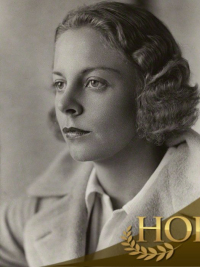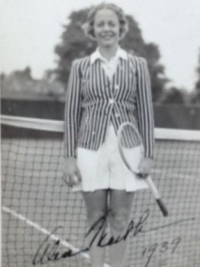Alice Marble
| Born |
Subscribe now
This information and data is not available because you are not our subscriber yet.
Please click here and get full access to the entire database! |
|---|---|
| Died | |
| Class of HOF | |
| Plays | |
| Bio | A woman of unmistakable glamour and athleticism, the striking Marble, wearing her familiar sun visor, altered the face of the women’s game. The first woman to play the serve-and-volley game, she demonstrated to the skeptics that it was indeed possible for a woman to master an aggressive, net-rushing style of play. She moved relentlessly through the 1939 and 1940 seasons without losing a singles match. Marble took the women’s game to another level with her groundbreaking methodology. Born in the small town of Beckwourth, Plumas County, California, Marble moved with her family at the age of five to San Francisco. A tomboy, she excelled in many sports, including baseball; but her brother persuaded her to try the more ladylike tennis. She quickly mastered the game, playing in Golden Gate Park. She suffered a setback at age fifteen when she was raped by a stranger, but she overcame the trauma and won several California junior tournaments. The first woman to serve and volley, and noted for aggressive play called the "killer instinct" approach. This may account for her decisive and easy victories in challenge and early rounds. Marble being all business on the court, after defeating an opponent love and love, would go back to the locker room and chat-discussing the match as a friend and confidant.[citation needed] the right-handed Marble was again[clarification needed] challenged in 1934 after collapsing during a match at the French Championships. Doctors diagnosed her with pleurisy and tuberculosis, and she took an extended rest. At the U.S. Championships, Marble won the Singles title (1936, 1938–40); the Women's Doubles title with Sarah Palfrey Cooke (1937–40); and the Mixed Doubles title with Gene Mako (1936), Don Budge (1938), Harry Hopman (1939), and Bobby Riggs (1940). At Wimbledon, Marble won the Singles title (1939); the Women's Doubles title with Cooke (1938–39); and the Mixed Doubles title with Budge (1937–38) and Riggs (1939). In Wightman Cup competition, Marble lost only one Singles and one Doubles match in the years she competed (1933, 1937–40). According to Wallis Myers and John Olliff of The Daily Telegraph and the Daily Mail, Marble was ranked in the World Top Ten 1936–39 (no rankings issued 1940–45), reaching a career high in those rankings of World No. 1 in 1939. Marble was included in the year-end Top Ten rankings issued by the United States Lawn Tennis Association in 1932–33 and 1936–40. She was the top-ranked U.S. player in 1936-40. Marble was the Associated Press Athlete of the Year in 1939 and 1940. After capping a stellar amateur career in 1940, Marble turned professional and earned a great sum of money, travelling around playing exhibition tournaments. Through illness and victory, Marble had the support of her coach and mentor, Eleanor "Teach" Tennant, who changed her technique and influenced her life. For a brief time after retirement, she worked on the Editorial Advisory Board of DC Comics and was credited as an Associate Editor on Wonder Woman. She created the "Wonder Women of History" feature for the comics, which told the stories of prominent women of history in comic form. During World War II, Marble was married to Joe Crowley, a pilot, who was killed in action over Germany. Only days before his death, she miscarried their child following a car accident. After an attempt to kill herself, she recuperated and, in 1945, agreed to spy for U.S. intelligence. Her mission involved renewing contact with a former lover, a Swiss banker, and obtaining Nazi financial data. The operation ended when a Nazi agent shot her in the back, but she was extracted and recovered. Few details of the operation ever emerged. The story was told only after her death when Courting Danger ISBN 0-312-92813-0, a second autobiography, was published. Marble greatly contributed to the desegregation of American tennis by writing an editorial in support of Althea Gibson for the July 1, 1950, issue of American Lawn Tennis Magazine. The article read, in part, "Miss Gibson is over a very cunningly wrought barrel, and I can only hope to loosen a few of its staves with one lone opinion. If tennis is a game for ladies and gentlemen, it's also time we acted a little more like gentle-people and less like sanctimonious hypocrites.... If Althea Gibson represents a challenge to the present crop of women players, it's only fair that they should meet that challenge on the courts." Marble said that, if Gibson were not given the opportunity to compete, "then there is an ineradicable mark against a game to which I have devoted most of my life, and I would be bitterly ashamed." Gibson, age 23, was given entry into the 1950 U.S. Championships, becoming the first African-American player, man or woman, to compete in a Grand Slam event. In 1964, Marble was inducted into the International Tennis Hall of Fame. She then settled in Palm Desert, California, where she taught tennis until her death. Weakened by pernicious anaemia, Marble died at a hospital in Palm Springs, California. Alice Marble Tennis Courts, providing a panoramic view of the Pacific ocean and the Golden Gate bridge from the top of Russian Hill in San Francisco, is named in honor of her. |
| Tournament | AO | RG | W | US | Win-Loss |
|---|---|---|---|---|---|
|
Subscribe now
This information and data is not available because you are not our subscriber yet.
Please click here and get full access to the entire database! |
|||||

